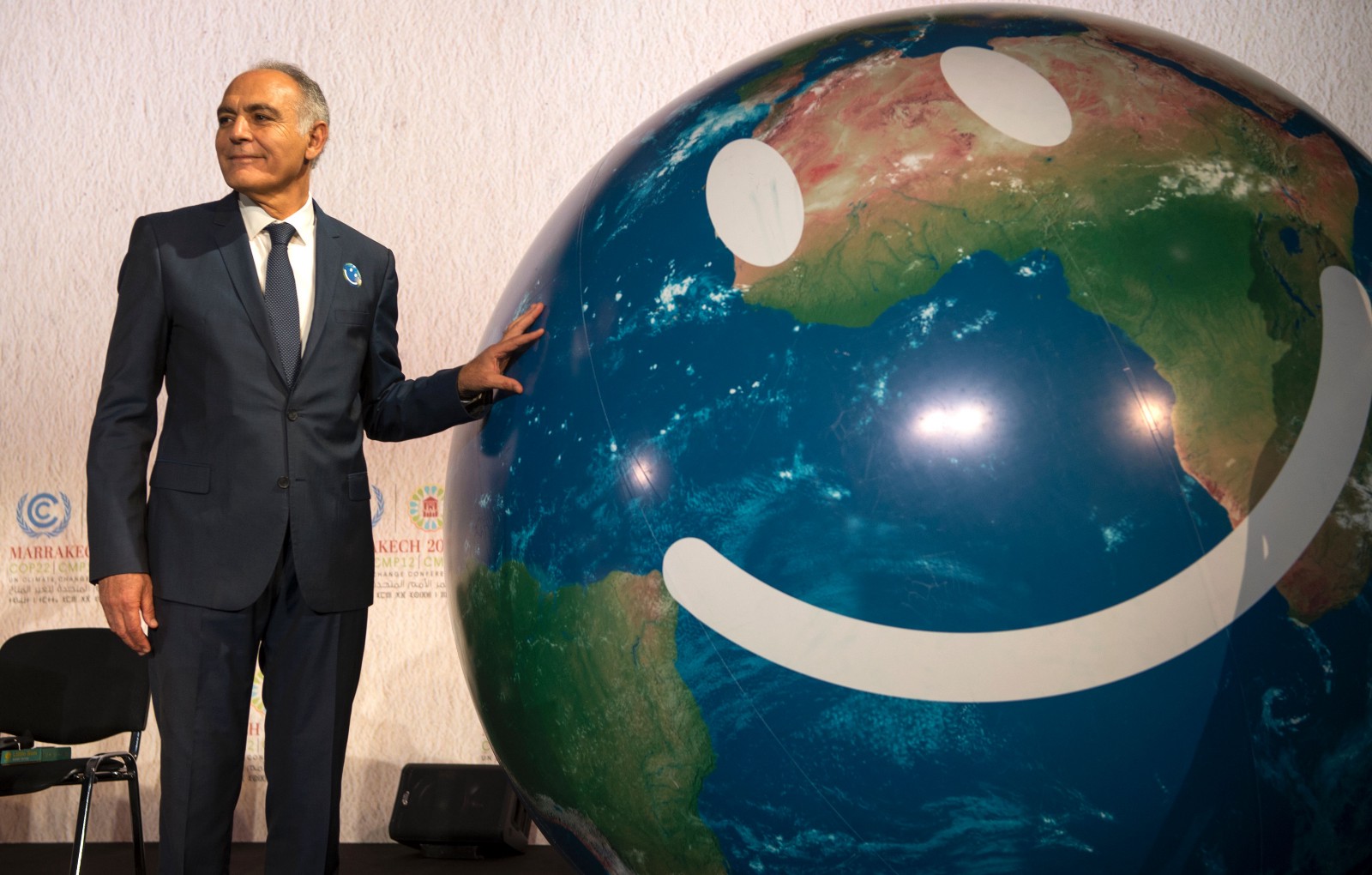
COP22 president Salaheddine Mezouar at the opening session of the COP22 climate talks in Marrakesh on November 7th, 2016 (Photo: Fadel Senna/AFP/Getty Images)
You could see hand-held lamps bobbing in the audience as the lights went down in Marrakech Hall. The lamps numbered 2,000; they were solar-powered and shaped like fleurs d’Ethiopie, and they seemed to wink among the audience as Ségolène Royal (president of COP21 in Paris) handed Salaheddine Mezouar (incoming president of COP22) an inflatable globe with a grin plastered across the South Atlantic.
So began the long march of opening speeches, self-congratulation, and occasional recrimination that formed the opening day of COP22. We’ve included some of the more memorable lines below. They anticipate many of the themes that will govern the next two weeks.
“Three grand principles have guided my action on COP21 … above all, climate justice: The richest countries live as though there were three planets; the poorest countries as though there is no planet left.”
— Ségolène Royal, the president of COP21, at the opening plenary. Royal’s address was a sort of valediction, as she passed the torch from Paris to Marrakech. It was also a reminder that Royal is a gifted and beautiful orator, far different from the two relatively soft-spoken countrymen who flanked her at last year’s talks: François Hollande (with whom she has children) and Laurent Fabius. In public speech, Hollande is distinguished, unexcitable, and unlovely — a journeyman; Fabius is elegant but restrained and essentially donnish. By contrast, Royal had a lump in her throat by the close of this morning’s speech, right after this line: “The struggle for the environment and the struggle for women’s rights are the two threads of the same fabric.”
“By 2018, we need all countries to have joined, so Russia, South Africa, Japan, and others need to sign.”
— Liz Gallagher, director of the Climate Briefing Service, calling out some of the largest countries that still have not completed their internal process for ratifying the Paris Agreement. Once these countries sign, they will have decision-making authority in United Nations negotiations under the Paris Agreement; until they do, these countries are in an interesting state of diplomatic limbo. In the meantime, Mezouar says he will do everything he can to keep this year’s talks “inclusive.”
“Achieving the aims and ambitions of the Paris Agreement is not a given.”
— Patricia Espinosa, executive secretary of the U.N. Framework Convention on Climate Change, speaking at this morning’s convocation. Espinosa encouraged delegates and leaders not to rest on their laurels. In a morning full of laurel-perching, this was a bracing and useful admonition.
“In Paris last year, the world recognized that climate action is not only moving away from fossil fuels and moving to solar panels and wind farms; climate action is about saving lives.”
— Harjeet Singh of ActionAid, arguing that emissions mitigation alone cannot help the world’s most vulnerable.
Civil society advocates expressed frustration throughout the day that wealthier northern countries have been reluctant to beef up financing for adaptation. It’s an important flashpoint this year (as it has been, on and off, since the 1990s): Many poorer developing countries are facing immediate crises, even as they contribute little to global emissions, which means that these countries need adaptation funds way more urgently than they need mitigation strategies. Expect to hear a lot this week about how developed countries are stiffing the rest of the world on adaptation — and note the question of loss and damage sitting in the corner, causing Western negotiators to sweat.
“The two words you can’t get anyone to say at this conference are ‘Donald Trump.’”
— A reporter for a wire service, before asking Alden Meyer what happens to the Paris Agreement if Donald Trump wins the United States presidency tomorrow.
“My organization is not allowed to get involved in electioneering, so I won’t comment. I would just say that the American presidency is one of the most powerful positions in the world, but not even the American president has the power to halt the laws of physics.”
— Alden Meyer, director of strategy and policy for the Union of Concerned Scientists, in response.
“The test of this COP will be to deliver for the people of Africa. Failure condemns us to death. Please, don’t cook our continent.”
— Kwami Kpondzo of Friends of the Earth–Africa, speaking with reporters this afternoon.
“The Doha Amendment must be ratified immediately. The European Union is rushing like a Japanese express train to ratify the Paris Agreement, but what happened to the Doha Amendment?”
— Meena Raman, who was at COP18 in Doha, Qatar, and who wishes that the rest of the world would just sign the Kyoto Protocol Extension already.
“All you hear is speeches about how we have to care more and work harder. We really don’t need to do this every year. Every two years would be plenty.”
— a reporter, overheard in the Blue Zone complaining that COPs have become bloated, self-congratulatory, and boring.




